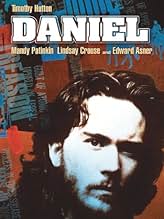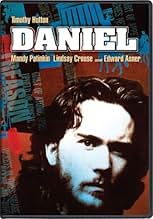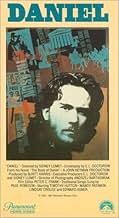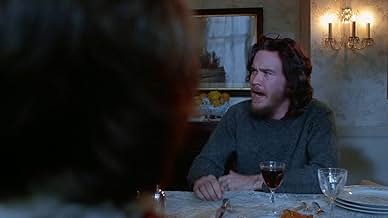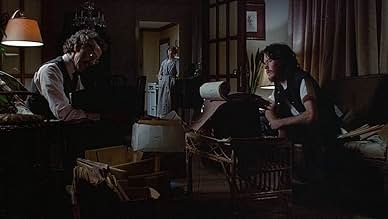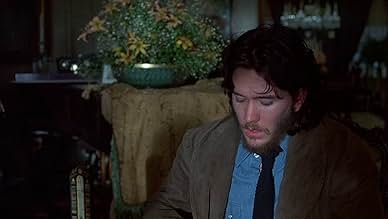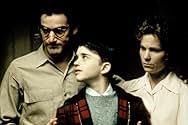IMDb RATING
6.6/10
1.7K
YOUR RATING
Daniel Isaacson attempts to determine the true complicity of his parents Paul and Rochelle Isaacson, who were executed for espionage in the 1950s.Daniel Isaacson attempts to determine the true complicity of his parents Paul and Rochelle Isaacson, who were executed for espionage in the 1950s.Daniel Isaacson attempts to determine the true complicity of his parents Paul and Rochelle Isaacson, who were executed for espionage in the 1950s.
Ilan Mitchell-Smith
- Young Daniel
- (as Ilan M. Mitchell-Smith)
- Director
- Writer
- All cast & crew
- Production, box office & more at IMDbPro
6.61.7K
1
2
3
4
5
6
7
8
9
10
Featured reviews
As an acquaintance of Robert Meeropol...
The story of Julius and Ethel Rosenberg, who were executed in 1953 on the trumped-up charge of spying for the Soviet Union, "Daniel" is fictionalized but still relevant. Mandy Patinkin and Lindsay Crouse play the Julius and Ethel characters Paul and Rochelle Isaacson, while Timothy Hutton is their son Daniel, trying all his life to try and find out what happened to them, and what was behind it.
I actually know Robert Meeropol (Julius and Ethel's real son). After he and his brother found out the truth behind their parents' execution (that the McCarthyites wanted to eliminate any opposition), they sued the government and won. They established the Rosenberg Fund for Children, to protect the families of political prisoners. On the 50th anniversary of his parents' execution, Robert Meeropol reminded the world that the "War on Terrorism" has replaced the Cold War.
As long as totalitarian governments exist, "Daniel" will remain a relevant movie. Or even under democracy, to remind people of despotism.
I actually know Robert Meeropol (Julius and Ethel's real son). After he and his brother found out the truth behind their parents' execution (that the McCarthyites wanted to eliminate any opposition), they sued the government and won. They established the Rosenberg Fund for Children, to protect the families of political prisoners. On the 50th anniversary of his parents' execution, Robert Meeropol reminded the world that the "War on Terrorism" has replaced the Cold War.
As long as totalitarian governments exist, "Daniel" will remain a relevant movie. Or even under democracy, to remind people of despotism.
An underestimated masterpiece (**** out of ****)
DANIEL
"Some day I shall understand"
Some words abouts the complex story. Paul and Rochelle Isaacson (Mandy Patinkin, Lindsay Crouse) were executed in the early 1950s for alleged espionage. Their children Daniel and Susan can't get over this. In the late 1960s, after an attempted suicide of his politically active sister Susan (Amanda Plummer), the rather unpolitical Daniel (Timothy Hutton) tries to find out what exactly happened in the past, tries to understand his parents' lives, tries to help his sister and to get along with his own life...
Sidney Lumet's film "Daniel" (1983) and E.L. Doctorow's novel "The Book of Daniel", which it is based upon, are inspired by the controversial Rosenberg case.
The film shows how children can be affected by the lives of their parents. And it is about the search of one's place in life. Lumet treated these themes again later in his fascinating "Running on Empty" (1988), starring River Phoenix, Christine Lahti and Judd Hirsch. Another theme of "Daniel" is the wish of human beings to understand their parents. Lumet described the movie in a Village Voice interview in the following way: "To me, "Daniel" is the story of a boy who buries himself with his parents, and spends the rest of his life trying to climb out of the grave." The film uses a complex flashback structure to tell its story. "Daniel" illuminates from Daniel Isaacson's view the history of the American left from the 1930s to the late 1960s, including the different left movements. In its criticism of death penalty and McCarthyism, "Daniel" is also a political statement.
Sidney Lumet is one of the great directors of the American cinema. Lumet himself is politically left-leaning, and "Daniel" is probably one of his most personal works. It was about seven years before he got the chance to realize this project. Many people worked on the film for the minimum salary set by the union. Timothy Hutton turned down a million-dollar offer on a film and played Daniel instead for about 25000 dollars.
And Lumet is right when he writes in his informative book "Making Movies": "Despite its critical and financial failure, I think it's one of the best pictures I've ever done." The film proves again Lumet's ability to tell complex, emotionally absorbing, unsentimental stories. Everything works in this uncompromising picture. A few of Lumet's films were marred by their scripts ("The Appointment", "Power", "Family Business", "A Stranger Among Us"). But Doctorow's screenplay for "Daniel" is excellent and extraordinarily multi-layered. Lumet's direction is sensitive and fascinating. Timothy Hutton (who later starred with Nick Nolte and Armand Assante in "Q & A"), Edward Asner (who plays the Isaacson's attorney), Lindsay Crouse (who also appeared in "Prince of the City" and "The Verdict"), Mandy Patinkin, Amanda Plummer and Ilan M. Mitchell-Smith (in the role of the young Daniel in the early 1950s) stand out in a fine cast. The impressive cinematography, which supports the flashback structure by a careful use of color filters, is by Andrzej Bartkowiak, who has worked on 11 Lumet pictures up to now. The rich soundtrack, mainly consisting of songs interpreted by Paul Robeson, perfectly fits and illustrates the film's themes. The editing is excellent as well (a good example is the brilliantly filmed end sequence).
There are many great moments in this film. For instance, there is a powerful rally scene in which you can feel that the Isaacson's children are afraid of the world around them. Another moving scene is a sequence in which young Daniel and young Susan (played by Ilan M. Mitchell-Smith and Jena Greco) walk through New York in search of their home. This scene, also showing Lumet's typically great use of the city of New York, reminded me of Michelangelo Antonioni.
I'm an admirer of Sidney Lumet's cinema. "Daniel" is one of his most underestimated motion pictures, really a must-see. Of course, don't expect standard Hollywood entertainment, but a serious work.
"Some day I shall understand"
Some words abouts the complex story. Paul and Rochelle Isaacson (Mandy Patinkin, Lindsay Crouse) were executed in the early 1950s for alleged espionage. Their children Daniel and Susan can't get over this. In the late 1960s, after an attempted suicide of his politically active sister Susan (Amanda Plummer), the rather unpolitical Daniel (Timothy Hutton) tries to find out what exactly happened in the past, tries to understand his parents' lives, tries to help his sister and to get along with his own life...
Sidney Lumet's film "Daniel" (1983) and E.L. Doctorow's novel "The Book of Daniel", which it is based upon, are inspired by the controversial Rosenberg case.
The film shows how children can be affected by the lives of their parents. And it is about the search of one's place in life. Lumet treated these themes again later in his fascinating "Running on Empty" (1988), starring River Phoenix, Christine Lahti and Judd Hirsch. Another theme of "Daniel" is the wish of human beings to understand their parents. Lumet described the movie in a Village Voice interview in the following way: "To me, "Daniel" is the story of a boy who buries himself with his parents, and spends the rest of his life trying to climb out of the grave." The film uses a complex flashback structure to tell its story. "Daniel" illuminates from Daniel Isaacson's view the history of the American left from the 1930s to the late 1960s, including the different left movements. In its criticism of death penalty and McCarthyism, "Daniel" is also a political statement.
Sidney Lumet is one of the great directors of the American cinema. Lumet himself is politically left-leaning, and "Daniel" is probably one of his most personal works. It was about seven years before he got the chance to realize this project. Many people worked on the film for the minimum salary set by the union. Timothy Hutton turned down a million-dollar offer on a film and played Daniel instead for about 25000 dollars.
And Lumet is right when he writes in his informative book "Making Movies": "Despite its critical and financial failure, I think it's one of the best pictures I've ever done." The film proves again Lumet's ability to tell complex, emotionally absorbing, unsentimental stories. Everything works in this uncompromising picture. A few of Lumet's films were marred by their scripts ("The Appointment", "Power", "Family Business", "A Stranger Among Us"). But Doctorow's screenplay for "Daniel" is excellent and extraordinarily multi-layered. Lumet's direction is sensitive and fascinating. Timothy Hutton (who later starred with Nick Nolte and Armand Assante in "Q & A"), Edward Asner (who plays the Isaacson's attorney), Lindsay Crouse (who also appeared in "Prince of the City" and "The Verdict"), Mandy Patinkin, Amanda Plummer and Ilan M. Mitchell-Smith (in the role of the young Daniel in the early 1950s) stand out in a fine cast. The impressive cinematography, which supports the flashback structure by a careful use of color filters, is by Andrzej Bartkowiak, who has worked on 11 Lumet pictures up to now. The rich soundtrack, mainly consisting of songs interpreted by Paul Robeson, perfectly fits and illustrates the film's themes. The editing is excellent as well (a good example is the brilliantly filmed end sequence).
There are many great moments in this film. For instance, there is a powerful rally scene in which you can feel that the Isaacson's children are afraid of the world around them. Another moving scene is a sequence in which young Daniel and young Susan (played by Ilan M. Mitchell-Smith and Jena Greco) walk through New York in search of their home. This scene, also showing Lumet's typically great use of the city of New York, reminded me of Michelangelo Antonioni.
I'm an admirer of Sidney Lumet's cinema. "Daniel" is one of his most underestimated motion pictures, really a must-see. Of course, don't expect standard Hollywood entertainment, but a serious work.
A Radical Tradition
In filming E.L. Doctorow's fictionalized account of the Rosenberg case and its implications for the children of Julius and Ethel Rosenberg, Sidney Lumet brought a good vision to the finished product. Lumet grew up in those times and had I'm sure peripheral associations with the kind of people that would have gone the same way as Julius and Ethel or in the case of the film and novel, Paul and Rochelle Isaacson. Lumet's love of New York also helps a lot in this film.
The fictionalized Rosenbergs are played by Mandy Patinkin and Lindsay Crouse. We get the idealism of the Rosenbergs, the history of persecution they felt, the empathy for other minorities. It should never be forgotten that it was Communists for their own reasons, but still were the first ones to take up black civil rights as a group cause. Radical politics and all, Patinkin and Crouse give their children a fine set of universal values to live by.
The real Rosenberg sons were adopted by another couple and to this day still try and claim a good legacy for their parents. In the film the title role of Daniel is played by Timothy Hutton and his sister is played by Ellen Barkin. Years after the executions of their parents they have continued the radical traditions of the parents, but they're into the protest politics of the sixties, involved in a mass movement the parents only dreamed about, but hardly under the auspices of the Communist Party USA.
Barkin is caught up in the moment, but Hutton wants to clear his parent's names. In real life it was Ethel Rosenberg's brother David Greenglass who fingered both of them as Communist spies. Greenglass was assigned as a sergeant to Los Alamos and purportedly did the actual stealing of the atomic bomb design. In other words for the kids it was a beloved uncle.
They should have kept that part of the story, but I'm willing to bet that E.L. Doctorow did not want to be sued by David Greenglass who is still alive now, so a family friend and hanger-on with the Communists played by Joseph Leon is the informer.
The highlight of the film is the confrontation scene with Hutton and Tovah Feldshuh playing the daughter of Joseph Leon. The growing up experiences of both are laid out naked and bare, the acting is some of the best both these players have ever done.
In real life Julius Rosenberg was guilty of being a ringleader of a nest of Communist spies. Ethel Rosenberg's guilt is far more problematic, the closest you could come to here is Mrs. Mary Surratt who ran the boardinghouse where Booth and his fellow conspirators met in the Lincoln assassination plot. Her son was part of the ring, but he fled the country so the country in the ill tempered mood it was in, countenanced the hanging of the mother instead. Ethel was probably supportive of her husband's activities as a dutiful wife and nothing more.
What is also clear is that the US government threw out the rulebook when it came to due process in the prosecution of the case. It was the times, you had to have been there.
Although it's not the real story, no more than Billy Bathgate was about Dutch Schultz, E.L. Doctorow and Sidney Lumet weave a very fine tale about some troubled times.
The fictionalized Rosenbergs are played by Mandy Patinkin and Lindsay Crouse. We get the idealism of the Rosenbergs, the history of persecution they felt, the empathy for other minorities. It should never be forgotten that it was Communists for their own reasons, but still were the first ones to take up black civil rights as a group cause. Radical politics and all, Patinkin and Crouse give their children a fine set of universal values to live by.
The real Rosenberg sons were adopted by another couple and to this day still try and claim a good legacy for their parents. In the film the title role of Daniel is played by Timothy Hutton and his sister is played by Ellen Barkin. Years after the executions of their parents they have continued the radical traditions of the parents, but they're into the protest politics of the sixties, involved in a mass movement the parents only dreamed about, but hardly under the auspices of the Communist Party USA.
Barkin is caught up in the moment, but Hutton wants to clear his parent's names. In real life it was Ethel Rosenberg's brother David Greenglass who fingered both of them as Communist spies. Greenglass was assigned as a sergeant to Los Alamos and purportedly did the actual stealing of the atomic bomb design. In other words for the kids it was a beloved uncle.
They should have kept that part of the story, but I'm willing to bet that E.L. Doctorow did not want to be sued by David Greenglass who is still alive now, so a family friend and hanger-on with the Communists played by Joseph Leon is the informer.
The highlight of the film is the confrontation scene with Hutton and Tovah Feldshuh playing the daughter of Joseph Leon. The growing up experiences of both are laid out naked and bare, the acting is some of the best both these players have ever done.
In real life Julius Rosenberg was guilty of being a ringleader of a nest of Communist spies. Ethel Rosenberg's guilt is far more problematic, the closest you could come to here is Mrs. Mary Surratt who ran the boardinghouse where Booth and his fellow conspirators met in the Lincoln assassination plot. Her son was part of the ring, but he fled the country so the country in the ill tempered mood it was in, countenanced the hanging of the mother instead. Ethel was probably supportive of her husband's activities as a dutiful wife and nothing more.
What is also clear is that the US government threw out the rulebook when it came to due process in the prosecution of the case. It was the times, you had to have been there.
Although it's not the real story, no more than Billy Bathgate was about Dutch Schultz, E.L. Doctorow and Sidney Lumet weave a very fine tale about some troubled times.
Powerful but Manipulative
In 1951, Julius and Ethel Rosenberg were tried and convicted of conspiring to deliver atomic secrets to Russia during the 40s (when the U.S. and Russia were wartime allies). The trial took place in an atmosphere of anti-Communist hysteria.
Prior to their arrest, the following events took place: State Department official Alger Hiss was convicted of perjury, Senator Joseph McCarthy launched a campaign to rid the State Department of "subversives", British physicist Klaus Fuchs was convicted of spying for the Russians, Russia exploded an atomic bomb, and the Korean War broke out.
The chief prosecution witnesses were chemist Harry Gold who admitted he had never seen or known either Rosenberg, and Ethel's brother David Greenglass, a machinist working on the Manhattan project in Los Alamos, who provided the jury with details of the Rosenberg's involvement in espionage. Ethel's guilt was based solely on Greenglass' testimony that she had typed up classified secrets (this account was later acknowledged by Greenglass to be false).
In 1953, Julius and Ethel were executed after numerous appeals for clemency had been rejected. The executions caused deep divisions among the American people and the Rosenbergs were the last Americans to be executed for sabotage. Fifty years later, we are still trying to come to terms with the case.
Daniel, a 1983 film based on the novel "The Book of Daniel" by E.L. Doctorow, is a fictional account of the trial and execution of Julius and Ethel Rosenberg (called Paul and Rochelle Isaacson in the movie) focusing on how these events affected their children. Turning in a strong performance, Timothy Hutton plays their son Daniel, who is searching for the truth about his parent's guilt or innocence. Amanda Plummer is his sister Susan (in reality, the Rosenbergs had two sons Robert and Michael) who suffers a mental breakdown as a result of the execution, and Ed Asner portrays the Isaacson's lawyer who did his best for the parents, who are shown as self-righteous and uncooperative.
The movie unfolds in numerous flashbacks delineated by color filters (blue for current, orange for past). Lumet shows the Isaacsons (Mandy Patinkin and Lindsay Crouse) participation in protest movements and Communist Party activities and depicts their arrest, confinement, trial, and execution. The film does not make any statement as to their guilt or innocence. However, in an emotional scene with their accuser's sister, Daniel speculates that Rochelle's brother Selig Mindish (Joseph Leon) fingered the Isaacsons to protect other Party members.
Most of the film centers on the parent's relationship with the children. While showing how much the parents loved them, it also makes clear that their dedication to political causes transcended everything else in their lives (they could have been freed if they named names but their politics dictated that they would not cooperate with the FBI).
Daniel successfully captures the hysteria of the period and the suffering of the children who were shunted between overburdened relatives, children's shelters, and foster parents. In one of the most moving scenes in the film, Daniel and Susan run away from the shelter to walk the streets of New York looking for their old home, while in the background Paul Robeson sings, "This Little Light of Mine".
Though Daniel is a powerful and moving drama, the film is flawed by Patinkin's over-the-top performance, fake Jewish accents, and confusing jumps between different time periods. I also thought Susan's character was created solely to manipulate the emotions. Is Daniel is a great film? No, I don't think it is, but I do love it for its passion and for the courage it shows in bringing to life a difficult and troubling episode in American history.
Prior to their arrest, the following events took place: State Department official Alger Hiss was convicted of perjury, Senator Joseph McCarthy launched a campaign to rid the State Department of "subversives", British physicist Klaus Fuchs was convicted of spying for the Russians, Russia exploded an atomic bomb, and the Korean War broke out.
The chief prosecution witnesses were chemist Harry Gold who admitted he had never seen or known either Rosenberg, and Ethel's brother David Greenglass, a machinist working on the Manhattan project in Los Alamos, who provided the jury with details of the Rosenberg's involvement in espionage. Ethel's guilt was based solely on Greenglass' testimony that she had typed up classified secrets (this account was later acknowledged by Greenglass to be false).
In 1953, Julius and Ethel were executed after numerous appeals for clemency had been rejected. The executions caused deep divisions among the American people and the Rosenbergs were the last Americans to be executed for sabotage. Fifty years later, we are still trying to come to terms with the case.
Daniel, a 1983 film based on the novel "The Book of Daniel" by E.L. Doctorow, is a fictional account of the trial and execution of Julius and Ethel Rosenberg (called Paul and Rochelle Isaacson in the movie) focusing on how these events affected their children. Turning in a strong performance, Timothy Hutton plays their son Daniel, who is searching for the truth about his parent's guilt or innocence. Amanda Plummer is his sister Susan (in reality, the Rosenbergs had two sons Robert and Michael) who suffers a mental breakdown as a result of the execution, and Ed Asner portrays the Isaacson's lawyer who did his best for the parents, who are shown as self-righteous and uncooperative.
The movie unfolds in numerous flashbacks delineated by color filters (blue for current, orange for past). Lumet shows the Isaacsons (Mandy Patinkin and Lindsay Crouse) participation in protest movements and Communist Party activities and depicts their arrest, confinement, trial, and execution. The film does not make any statement as to their guilt or innocence. However, in an emotional scene with their accuser's sister, Daniel speculates that Rochelle's brother Selig Mindish (Joseph Leon) fingered the Isaacsons to protect other Party members.
Most of the film centers on the parent's relationship with the children. While showing how much the parents loved them, it also makes clear that their dedication to political causes transcended everything else in their lives (they could have been freed if they named names but their politics dictated that they would not cooperate with the FBI).
Daniel successfully captures the hysteria of the period and the suffering of the children who were shunted between overburdened relatives, children's shelters, and foster parents. In one of the most moving scenes in the film, Daniel and Susan run away from the shelter to walk the streets of New York looking for their old home, while in the background Paul Robeson sings, "This Little Light of Mine".
Though Daniel is a powerful and moving drama, the film is flawed by Patinkin's over-the-top performance, fake Jewish accents, and confusing jumps between different time periods. I also thought Susan's character was created solely to manipulate the emotions. Is Daniel is a great film? No, I don't think it is, but I do love it for its passion and for the courage it shows in bringing to life a difficult and troubling episode in American history.
10devinyl
One of the best movies I've ever seen
Excellent, fictionalized account of the Rosenberg story. Looked at from all perspectives from the early 1950's to the late 60's. We come away not caring if they did it or not! Lindsay Crouse stands out in her role as Rochelle. Mandy Patinkin is excellent. as always. They seem to steal the show from Hutton. The Paul Robeson (Monitor label) recordings also add to the picture's stunning realism. This is certainly one of the better movies of the early 1980's. The E.L. Doctorow screenplay is better than the novel, "The Book of Daniel" which I thought was rather strange. If I hadn't seen the movie first, I would have been lost just reading the book.
Did you know
- TriviaReportedly, actor Timothy Hutton wanted his part so much he had his agent constantly telephone director Sidney Lumet to organize an interview. Later, Hutton flew to New York at his own cost, met with Lumet, and within twenty minutes had secured the role.
- Quotes
Paul Isaacson: If they didn't arrest people, they'd have nothing to do.
- Alternate versionsNBC edited 33 minutes from this film for its 1987 network television premiere.
- ConnectionsFeatured in By Sidney Lumet (2015)
- How long is Daniel?Powered by Alexa
Details
- Release date
- Countries of origin
- Languages
- Also known as
- Дэниел
- Filming locations
- Production companies
- See more company credits at IMDbPro
Box office
- Gross US & Canada
- $687,475
- Gross worldwide
- $687,475
Contribute to this page
Suggest an edit or add missing content


